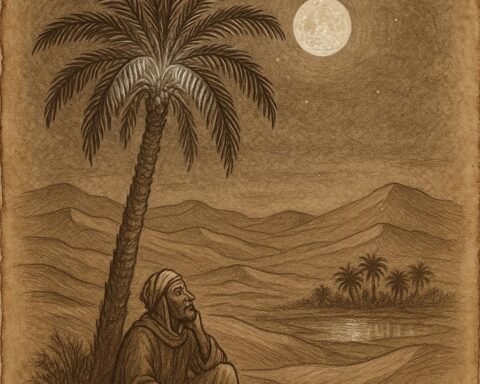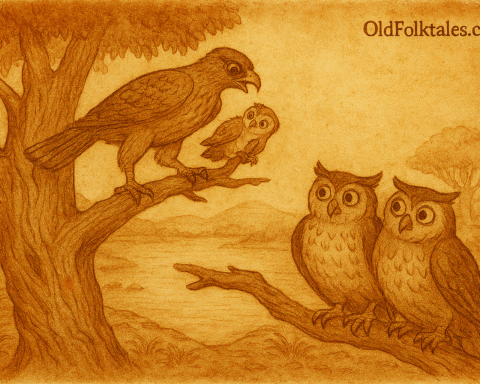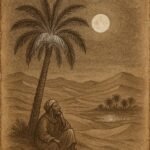Long ago, in the earliest days of the world, life was very different from what we know now. In those times, men and women did not die. They grew old, their hair turned white, their backs bent with age, yet they lived on and on. Death was unknown, and the earth was filled with generations upon generations of people.
But balance was needed in the world. The Moon, who shone brightly in the heavens, was given the task of sending a message to humankind. She wanted men and women to understand that their lives would follow her cycle. Just as she disappeared in the dark of the sky and returned again with her silver light, so also should people die and then rise again, renewed and reborn.
The Moon thought carefully about who should deliver this message. After much reflection, she called the Hare. “Go to the people,” the Moon said, her voice calm and steady. “Tell them that as I die away and rise again, so too shall they die and then live again. Let them know they will not be lost forever, for life will return to them just as I return each month.”
The Hare bowed, but inside he was restless. Some say the Hare was careless. Others whisper that jealousy and mischief lived in his heart. Instead of carrying the Moon’s message faithfully, the Hare changed it. When he reached the people, he stood tall and declared, “As I die and perish, so you also shall die and perish. There will be no rising again. When death comes, it will be the end.”
The people listened in silence. Some felt sorrow, others fear, but none dared question the message. They believed the Hare had spoken truthfully on behalf of the Moon. And so, from that day, death settled over mankind like a shadow that would never lift.
When the Hare returned, the Moon asked him gently, “What words did you carry to the children of earth?”
The Hare replied without shame, “I told them that as I die and perish, so also shall they perish. They will not rise again.”
The Moon’s glow darkened with fury. “You fool!” she cried. “You have spoken wrongly, and because of your careless tongue, men shall indeed die and never live again.” In her anger, the Moon struck the Hare on the mouth with such force that his lip split in two. From that day to this, the Hare’s lip has always been divided, a mark of his betrayal and a sign of the curse he brought upon humankind.
And so death came into the world, not because the people had chosen it, but because of the Hare’s twisted words. The Moon still shines as a reminder of what might have been, and the Hare still bears his split lip, a scar of the day he changed the destiny of humankind.
Moral Lesson
The story of The Origin of Death teaches that words carry great power. A careless tongue can bring sorrow that lasts for generations, just as the Hare’s false message brought death to mankind. It reminds us that truth should never be twisted, and messages of hope must be carried with honesty and respect.
Knowledge Check
What message did the Moon want the Hare to deliver to mankind in the story of The Origin of Death?
The Moon wanted the Hare to tell mankind that just as she dies and rises again, so too would humans die and then live again.What false message did the Hare deliver instead in The Origin of Death?
The Hare told people that they would die and perish forever without rising again.Why did the Moon become angry with the Hare in The Origin of Death?
The Moon grew angry because the Hare twisted her message, changing hope into despair.What physical mark did the Hare receive as punishment in The Origin of Death?
The Moon struck the Hare, splitting his lip, and since then, hares have a divided upper lip.According to The Origin of Death, why do humans now die permanently?
Humans die permanently because the Hare delivered the wrong message, sealing mankind’s fate.What is the central lesson from The Origin of Death?
The lesson is that words are powerful, and dishonesty or carelessness can bring lasting harm to others.Source: Nigerian folktale, passed down through oral tradition across different communities in West Africa.






